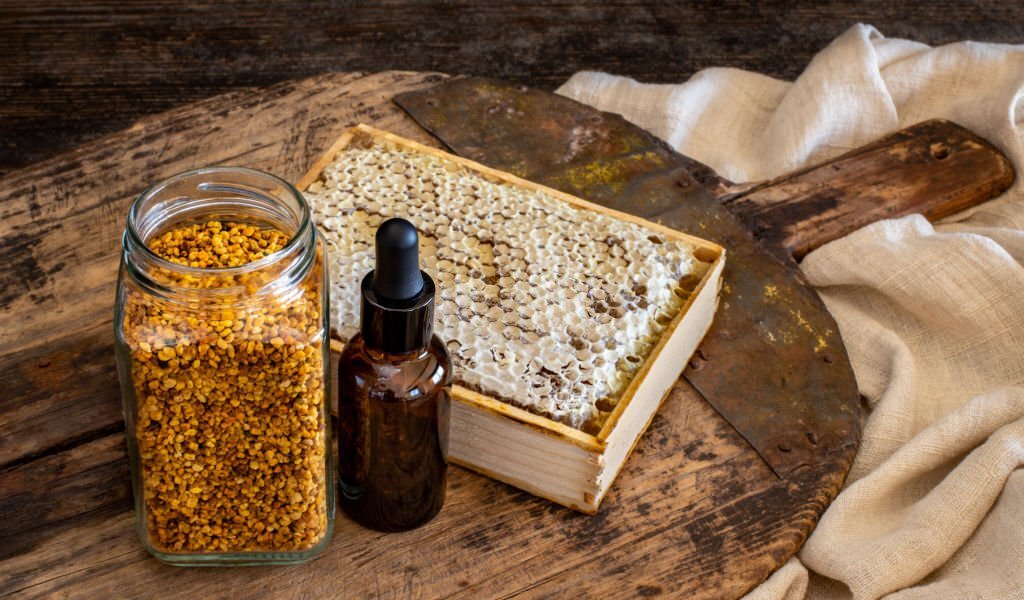Many people are well aware of the nutritional benefits of unpasteurized raw honey – but how many are aware of its relatives, royal jelly and bee pollen?
Bee pollen is regularly touted as an extremely beneficial supplement for women experiencing uncomfortable menopause symptoms or men facing infertility.
Bee pollen is essentially a mixture of honey, flower pollen, bee secretions (saliva), enzymes, and nectar – the flower and plant pollen that is collected by bees is then stored and used as food in the beehive.
There are a wide variety of claims associated with bee pollen online, and there is merit to many of them, as they come backed by documented research studies.
Bee pollen naturally contains a wide array of biologically active substances. Many of these have documented beneficial effects that are well-researched. These include enzymes, antioxidants, fatty acids, carbohydrates, minerals, proteins, amino acids, and vitamins (especially B vitamins!).
While bee pollen’s antioxidant capacity will depend entirely on the plant or flower source, most studies indicate a high level of antioxidants including quercetin and glutathione across different bee pollen products.
Quercetin and glutathione are two extremely potent antioxidants for protecting the body against free radical damage from oxidative stress, inflammation, and environmental toxins.
Bee Pollen
Bee pollen generally comes in the form of either granules (which are low-temperature treated to extend shelf life, but do not impact potency or the nutritional content) or supplemental (capsule) form.
This is not to be confused with bee propolis, which is composed of resin that contains a combination of bee secretions (saliva), beeswax, and pollen (in a substantially lower amount).
Propolis is used by the bees to ‘seal’ the beehive from bacteria and intruders. Propolis is more well-known and regarded for its natural antibacterial and antiviral properties, which is why it serves a different function for those looking to supplement.
Many throat sprays or toothpaste products are available with propolis, as they can protect from harmful microorganisms, and inhibit bacterial and viral replication. Throat sprays with bee propolis have become increasingly popular within the last few years.
Pollen, on the other hand, is more of a nutritional supplement containing compounds you will not find in propolis, honey, or royal jelly.
They do serve different purposes and have different biological makeups.
Royal Jelly
Royal Jelly is often used for hormonal imbalances or concerns with menopause symptoms as well, as a functional nutritional supplement.
This substance is the original food for bee larvae and the queen bee – which is the only bee that continues to utilize this food for sustenance throughout her life span. Royal jelly is attributed as being responsible for her size in comparison to worker bees.
Royal jelly is more of a creamy substance that can be found in raw liquid form, or in supplemental (capsule) form as an extract.
Both royal jelly and bee pollen appear to provide relief for those experiencing menopause symptoms and premenstrual syndrome – with users of both reporting reductions in symptoms in the course of daily use from 1-2 months.
Bee-Products for Menopause Symptoms
Menopause symptoms can range from mild irritancy to debilitating for many: these might include hot flashes, night sweats, weight gain, fatigue, brain fog, and depression – all of which can significantly impact everyday life.
While some may avoid this through diet alone, some may opt for HRT to manage symptoms. Those who don’t want to take hormone therapy can look to naturally supplement things like bee pollen, royal jelly, and evening primrose oil as alternatives that can provide relief.
There are a variety of studies indicating a reduction in symptoms among 60-70% of women using a bee pollen supplement compared to placebo groups.
Bee pollen specifically may be beneficial for fertility and reproductive concerns. One of the compounds in bee pollen – chrysin, is an ‘aromatase’ inhibitor. What this means is the conversion of testosterone to estrogen (which is this enzyme’s role) is blocked and may lead to lower levels of estrogen in women and men. It also appears to help regulate ovarian function in women by increasing estradiol and progesterone steroid hormone production.
Safety Profile of Bee Propolis and Royal Jelly – Are They Right for Me?
Generally, both are considered quite safe to consume. The only primary concern is an allergic reaction, in which case users should be discontinued and a doctor consulted if any sort of allergic reaction occurs like hives, itching, nausea, or upset stomach.
As there isn’t substantial evidence to support use in pregnant women or those breastfeeding, it should be ruled out for use in babies, pregnant or nursing mothers.
Royal jelly and bee pollen may also act as natural blood thinners, so those taking prescription medications should consult with a professional prior to use. Another aside is that it is evident that bee pollen and royal jelly have the ability to impact hormone levels (estrogen and testosterone) so for those with normal hormone levels, symptoms and usage should be monitored for any changes.

